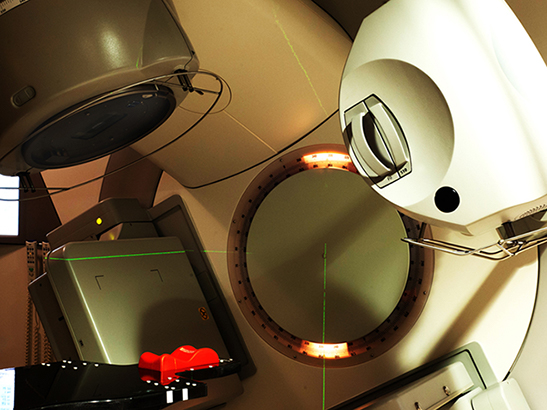
Intensity-modulated radiotherapy (IMRT) equipment (photo: Jan Chlebik/the ICR)
Changing the intensity of radiotherapy to protect the salivary glands could help treat a rare type of head and neck cancer and improve patients’ day-to-day lives, a new study shows.
Scientists at The Institute of Cancer Research, London, found that in 36 patients with head and neck cancer of unknown origin, a radiotherapy technique called intensity modulated radiotherapy (IMRT) was as effective as conventional radiotherapy at preventing the return of the disease.
The technique limits high doses of radiation to areas of the mouth like the salivary glands, which could reduce side-effects that cause patient to be left with a permanent dry mouth.
Radiotherapy plans that target head and neck cancer while minimising damage to important organs in the area are critical to help patients live normal lives.
The study, published in the journal Clinical Oncology, was funded by Cancer Research UK, with additional support from the National Institute for Health Research Biomedical Research Centre at the ICR and The Royal Marsden Hospital.
Side-effects reduced
For some patients diagnosed with head and neck cancer, it’s not always possible to detect where their cancer developed, which makes treating the disease more difficult.
Radiotherapy plans that treat the entire lining of the throat and lymph glands in the neck can cause uncomfortable side-effects for patients, such as permanent dry mouth, but plans covering smaller areas risk under-treating the cancer and can lead patients to relapse later on.
Scientists at the ICR and The Royal Marsden NHS Foundation Trust treated 36 patients with head and neck cancer of unknown origin using IMRT to reduce radiation delivered to the salivary glands.
They observed that avoiding giving a high dose of radiotherapy to the salivary glands helped prevent side-effects after treatment which impact on patients’ quality of life.
Two years after radiotherapy, 90% of patients were disease free and on average four years after treatment the technique showed good control of their disease compared with similar published studies.
'An effective strategy'
Rates of serious side-effects after treatment were comparable with similar research, showing this form of radiotherapy is effective at treating the disease.
Professor Kevin Harrington, Joint Head of the Division of Radiotherapy and Imaging at the ICR and a consultant at The Royal Marsden, said: “Radiotherapy for head and neck cancers often cause problems with permanent dry mouth, which can have an impact on eating, speaking or swallowing, and on patients’ quality of life. Using radiotherapy treatment plans that avoid these organs can help prevent the most serious side-effects.
“This is the first time we have shown clinically that using IMRT to spare salivary glands is an effective strategy for treating patients with head and neck cancer of unknown origin, and can prevent uncomfortable side-effects. “
